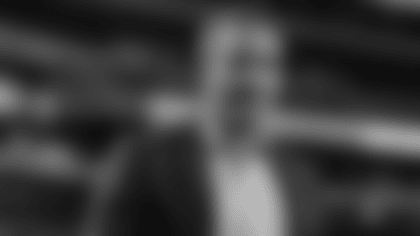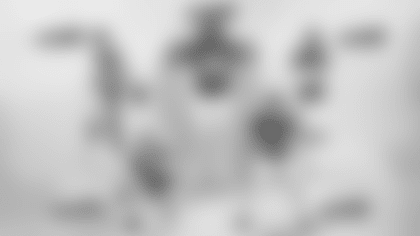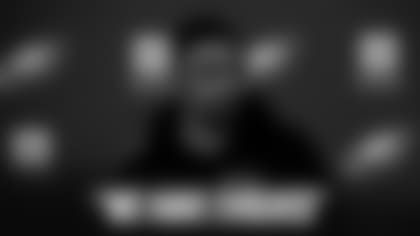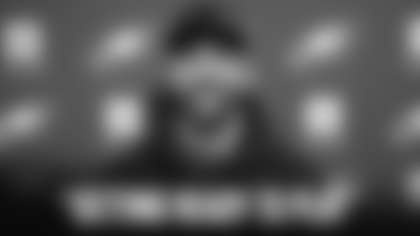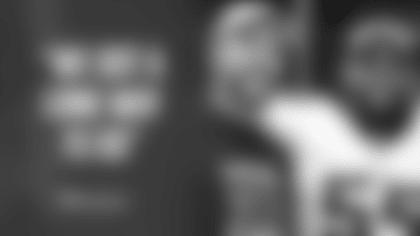Q. Generally, how much different do you think a team that you just played two weeks ago will look? What kind of different looks will they show you? COACH SHURMUR: They will be the same team that we're going to play again. Certainly, we expect them to come in and play their best. For us to come out with the outcome that we want, we have to really play well.
Q. When you look back at the film from the Seattle game, what did you see from QB Mark Sanchez?
COACH SHURMUR: He was just like everybody on offense: we didn't play well enough. Everybody out there had a handful of plays they would like to have back, and it kind of added up on us.
Q. What was his read on the interception in the second half? It looked like WR Jordan Matthews may have been open. Did he go to the right place with the ball there?
COACH SHURMUR: The post throw? No, that one, he actually was flushed and as he was pushing up in the pocket he just -- initially Coop [WR Riley Cooper] was open. Coop was doing the right thing and the ball sort of got away from him a little bit and you see what happens.
Q. As the season has gone on there has been a decline in RB Darren Sproles' usage and his production. How do you get him going again?
COACH SHURMUR: I wouldn't say usage; we've got him out there and there have been times where we intend to get him the ball and we can't for some reason. The other team is obviously well aware when he's on the field, too. If he's doubled or for some reason he's covered, then you move on. We continue to have plays for him and then we normally have a normal rotation of running back‑type plays that it could be a smooth rotation where he's in there instead of [RB LeSean] McCoy.
Q. A third of his offensive touches came in the first two games. After those games what did you see defenses start to do?
COACH SHURMUR: I think they became aware of the fact and they quickly remembered what a great player he is. So at times, they will do things to take some of the things that we are trying to do, where we are trying to get the ball to Darren, away.
Q. So if he is drawing more coverage ‑‑
COACH SHURMUR: The ball goes someplace else.
Q. So wouldn't you want him on the field more because he's drawing so much coverage?
COACH SHURMUR: Not necessarily. We want him out there to play, but we also feel good about LeSean being in there and you've seen the last couple weeks, we've had formations and personnel groups with two halfbacks in there.
But, when you put two halfbacks in there, now you have to do the math. Now who do you take out? Do you take out one of our tight ends? Do you take out Jordan Matthews? Do you take out one of the outside receivers? You just try to get a nice little flow there.
Q. Sanchez only had two throws beyond 20 yards and a lot of passes were underneath on third downs and were short of the sticks. Was that the plan going in?
COACH SHURMUR: No. I mean, we had progressions that were deep to short. We also had some progressions where it was horizontal. We certainly didn't get enough plays. Heck, we only had 23 plays in the first half and that's certainly not what we're shooting for.
Q. You guys are such a rhythm offense. When you have those three downs, I think you ran 45 plays in all, how do you get that rhythm?
COACH SHURMUR: It's hard. That's where you've got to point to third downs, when we are not staying on the field and extending drives. And it always doesn't just fall on third down. When you have third‑and‑long situations it's because you're not executing on first and second down. We just didn't play well enough, and we put ourselves behind in a lot of situations against a really, really good defense. So when you do that, we can all see what the results are.
Q. With the fewer passes downfield out of Sanchez overall, does that speak more to the play calling or the quarterback's decision making?
COACH SHURMUR: No, we are calling the exact same plays. I understand your line of questioning and there's nothing to do with who is playing quarterback, whether we are throwing it downfield or not.
Q. So it's his decision then?
COACH SHURMUR: Well, there are times when we call a deep-to-short concept where they cover it deep so you throw it shorter. So it has nothing to do ‑‑ and I'll assure you we are calling the same types of plays with Mark that we did with [QB] Nick [Foles].
Q. So you don't think the quarterback differential and their respective strengths influence the deep ball?
COACH SHURMUR: He threw a deep ball this week to Coop, right? In double coverage, right? He threw one.
Q. Right.
COACH SHURMUR: Well, that was less than a good decision, right? That's not the one that was picked off. I'm talking about another one now. That one went far, too, right? If we want to just throw the ball far, we can do that, but we are trying –
Q. Where should have that throw been?
COACH SHURMUR: Typically you don't throw it to the double. Doesn't matter. It probably shouldn't have gone there.
Q. Those explosive plays wer such a big part of your offense last season.
COACH SHURMUR: Sure, and you know what, we got away with some explosive plays [last year.] If you'll remember, against Green Bay, we threw that same type of pass to DeSean [former Eagles WR DeSean Jackson], and he went up and got it with two guys around him. Coop was in position to do the same thing. We just didn't hit on it. I don't think ‑‑ I understand, again, your line of questioning, but the whole just 'chuck the ball deep thing' doesn't really point to total success on offense.
Q. What have you seen on film of Cooper? Is he doing what he needs to do and getting free in the ways that he needs to get free?
COACH SHURMUR: Sure, absolutely. Coop is doing ‑‑ I guess, I don't know you guys must all get together on that, too. Every week, we're answering questions about Coop. He's out there playing and competing, and the last time I checked, he's only had two drops and we all remember what game they were in, right? Q. They were both in the end zone, right?
COACH SHURMUR: Well, I don't know, but we remember what games they were, right? Other than that, when we've thrown him the ball, he catches it. So we don't have a problem with him. Somebody does, but we don't.
Q. Head Coach Chip Kelly said yesterday that you guys have seen more zone coverage than man this year. Why has that been the case do you think?
COACH SHURMUR: I don't know. I think each team goes in with a different theme of how they want to approach covering us, and I think when you look at the defenses and then you look at it in hindsight, there are reasons why. Sometimes they don't really feel great about their matchups maybe, so they just play a nice zone. Teams that like to play man will do it regardless. And then I think some of it comes down to who the teams are that you're playing.
Q. You mentioned DeSean Jackson earlier and he is a guy that made a lot of big plays down the field. Do you feel at times that you guys miss him?
COACH SHURMUR: No, not at all because I think Mac [WR Jeremy Maclin] can make plays down the field. I think Coop can make plays down the field and we've seen Jordan Matthews make some big plays, too. So we don't feel -- no, we don't. We are really comfortable with the guys we have. They are out there competing and fighting. And if we want to talk specifically about the last game, nobody played well enough and nobody coached well enough to win it, and we saw the results.
Q. What were the problems with the running game on Sunday?
COACH SHURMUR: You know, we just ‑‑ again, it came down to we just didn't get sometimes the push we needed. There were times when we had some holes that closed up on us quickly. They are a very fast defense and so you can create some space and all of a sudden it collapses. So a lot of it had to do with what we were doing, but give the Seahawks credit, they defended us well.
Q. It is not so much about Cooper dropping passes. Granted we might not really know what we are looking at, but there are times when it appears he breaks off routes and maybe he's not paying attention. Are you seeing the same thing?
COACH SHURMUR: No, we see it differently than you do, but we know exactly what routes are called and the adjustments of the routes depending on the coverage. We certainly see it differently than you do.
We are comfortable with him out there playing and we don't have a problem like I think some people questioning me do.
Q. Do you expect the Cowboys to defend you differently up front?
COACH SHURMUR: I don't know. I think they are going to have their wrinkles. Any time you play an opponent that you play twice, they will come in and do something maybe a little bit different than they did the time before. So we expect some change, but we don't ‑‑ and we had some predictions as to what they are going to be, but we'll just have to see how it reveals itself.
Q. When the first game of a division series goes the way it did against Dallas -- and things came pretty easily for you guys -- do you need to impress on your players that it's not going to be that easy again, and that this is a formidable opponent?
COACH SHURMUR: I think our guys will be well aware of what's at stake. After the way we played this past week, everybody's very attentive, regardless of who the next opponent is. And so we have got to have a good day today and we've got to just get back to work and put our best foot forward.
Q. Have you ever played a team twice in three weeks before?
COACH SHURMUR: Yeah, I remember it at some point. It sort of happens this time of year with all the division games being played at the end of the season.
You know, teams don't change too much. We may get a different percentage of man versus zone. We may get a little bit more pressure, but how they basically line up will be the same, and how we try to function on offense will be basically the same.
Q. Is your situation at right guard a week‑by‑week thing or are you just going to ride T/G Andrew Gardner?
COACH SHURMUR: Right now he's in there playing.
Q. You guys haven't lost back‑to‑back games since last October ‑‑
COACH SHURMUR: That's good news.
Q. What do Chip Kelly and the rest of the coaching staff do in a week like this?
COACH SHURMUR: It's no different than had we just won a game. Again, this is a normal Tuesday for us, so part of this day is cleaning up what happened on Sunday, and most of the day is about moving forward toward Dallas and that's where we're at.
Q. After such a lackluster offensive performance all around, is there a risk of a hangover effect going into Sunday?
COACH SHURMUR: I don't think so, no. No risk.
Q. Do you think Seattle defended Matthews a little bit different on those crossing routes? Particularly when CB Byron Maxwell was physical with him?
COACH SHURMUR: No. They played exactly ‑‑ they did less on defense than we expected. They played single-safety middle like we expected. They played a combination of man and zone, and on third down it was very similar until we got in third-and-long and you saw split safeties. They did less on defense than what we had planned for.
Q. Why couldn't you get things going on Sunday?
COACH SHURMUR: I think we all watched it. It came down to fundamental football. We got in third-down situations that we didn't convert. We talked about it earlier, when we get rolling then we have good success. We just didn't get it rolling.
Q. How does TE Zach Ertz's production and usage compare to your expectations for him coming into the season?
COACH SHURMUR: I think he's done a good job. I think he's one of most improved guys we have. When he's in there, he makes plays. I think he's doing a much better job in the blocking aspect of playing tight end.
Q. On the high throw from Sanchez, is that one you feel like Ertz should have caught?
COACH SHURMUR: Well, I think both guys will say -- Mark will say that he should have thrown it not so high and then Ertz will say that given another opportunity [he] might have caught it.
Q. The man versus zone difference from last year to this year, how much of that do you think Sproles is responsible for as far as other teams' approach?
COACH SHURMUR: Yeah, that's a good question, and that may have something to do with it. When you're on the inside of the defense and now you're matched up with a guy that you feel threatens you like Darren, that may cause you to play a little bit more zone.
Q. You guys have placed an emphasis on getting receivers that beat man last year because you faced it so much. What kind of receivers are good against seeing a lot of zone defenses?
COACH SHURMUR: Well, guys that can run routes against man certainly can run them against zone. There are two things for a receiver: you have to be able to catch the ball and you have to be able to beat bump‑and‑run, and that normally points to man when you talk about bump‑and‑run. If you have guys that can do that, then typically they can catch the ball in zones, too.
Q. So it doesn't work the other way, though?
COACH SHURMUR: Not always. There are certain receivers that don't do well against bump‑and‑run coverage and so then it's a moot point from there. If you can't get down the field, there's not much we can do with you.
Q. So is it more important to beat man?
COACH SHURMUR: Oh, sure. It's always about man first and then you react to zone.



